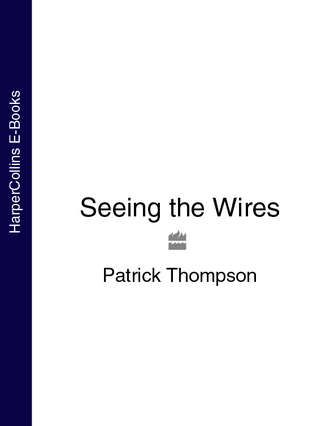
Полная версия
Seeing the Wires
‘You’re joking?’
‘I may be. We’ll have to see.’
‘How many kidneys do you have?’
‘What?’ Judy went to the living room and came back with a cigarette. She had started smoking after going out with me for a few weeks. I’d tried to give up but it hadn’t worked. She hadn’t tried to give up. She claimed she didn’t smoke much. If she didn’t, either my cigarettes were evaporating or we had some woodlice in the wainscoting that were going to have chest problems when they got older.
I didn’t know what wainscoting was. I thought it was something low in the house, around the level of skirting boards. Or was it on the roof? I wasn’t sure. I did know that I shared the house with woodlice. I presumed they were busy eating the floorboards from under me. If you went into a dark room and switched on the light, there would be one or two woodlice in the middle of the room, heading for nowhere in particular.
Woodlice have an interesting life cycle. As I understand it, based on personal observation, there are four stages in the life of a woodlouse. Firstly there is the not-existing stage. You don’t see baby woodlice, perhaps because they’re the size of molecules. You do see them when they get to the second stage, which is pretty small woodlice. Then they become pretty big woodlice, and then they become unmoving woodlice that turn out, on closer inspection, to be empty shells. If you turn them over, all of the workings have gone. They’re empty. No legs, no feelers, just shell. How do they get to the middle of the floor when they’re empty? Why do they go to the middle of my living room floor to die? Where do their insides go?
All of these questions. Woodlice made less sense than women. Silverfish were also peculiar. Every now and then one would turn up in the kitchen sink, zipping about and looking at the leftovers in the plughole. You can’t catch silverfish. I’ve tried. They’re too fast, and if you do catch one, you open your hand and there’s no silverfish. There’s a little patch of silver powder. Woodlice turn into empty shells when they die, but silverfish go one better. They turn into glitter dust. I’ve been plagued by strange insects ever since I moved into the house. Perhaps I was cruel to them in a former life.
‘Are you listening to me?’ Judy asked.
I knew this question. It didn’t have a right answer. If I told the truth – that I had no idea what she’d been talking about because I’d been thinking about woodlice and silverfish – I’d be in trouble. If I lied, she’d ask me what she’d been talking about and I’d be in trouble when I didn’t know. There are a couple of wildcards for this – decorating the kitchen, say, or buying some new curtains for one of the rooms upstairs – but you can’t rely on them.
‘I think I’m going deaf,’ I said, trying a new approach.
‘Going bloody mad, more like,’ said Judy. ‘Why don’t you listen to me?’
‘I have a headache.’
I did an expression of pain and contrition. Judy did an expression of grim disbelief.
‘What, and it’s got your ears? I have headaches and they don’t affect my ears. Is it something peculiar to you? Or a new plague that I’ll be reading about in New Scientist?’
‘I need an aspirin.’ I went to the kitchen cupboard where I store my painkillers. I hadn’t got any. ‘I haven’t got any.’ I sat down again.
‘You haven’t got any because you didn’t get any, and you didn’t get any because you didn’t pay any attention to me when I told you you’d run out.’
‘How did I run out? There was a full box in there.’
‘I had a couple.’
‘You did? Why?’
‘I had a headache. Now, I told Lynn I’d go into work this afternoon. So I’m going into work this afternoon, unless that’s going to put you out. I told you all about it yesterday.’
‘Oh yes,’ I lied, nodding. I didn’t remember that. Perhaps I didn’t pay as much attention to her as I should.
It’s not my fault, of course. Men will bear me out on this. Women don’t tell you anything all night long. Then on comes a programme you want to watch and off they go, rattling away, asking you about frocks and wallpaper and other things you can’t make sense of. It’s almost as though they’re interested in it all. I don’t know how their minds work at all. Sometimes I hug Judy and half expect her to vanish, leaving a big powdery stain on my clothes.
She went to work and I went to the shops to get painkillers. When I got back I offered the woodlice some, but they didn’t pay any attention.
‘I know how she feels,’ I told them, and they trundled across the draining board in search of bigger crumbs. I remembered what Jack had said. He’d said we’d murdered five people. He was obviously wrong. He’d got his wires crossed, which was bound to happen given that he was run through with them. I hadn’t murdered anyone. I didn’t have what it took. I got nervous just pushing woodlice off the draining board.
PART TWO
Sam, aged twenty
Chapter Five
I
I’m Sam. I’m twenty. I’ve been twenty for more than eight months now, and it’s been a short eight months. Time seems to be speeding up the older I get. I worry about that. I worry about a lot of things. Time used to run a lot slower. A year used to be a year and now it’s six months. Time’s devaluing. It’s being hit by inflation.
‘Take the time to think about it,’ my mother used to say. Not about anything in particular. She just used to say it. She still does. She’s got a stack of things she says that mean nothing to anyone else. I don’t think they mean anything to her, either.
‘In a bottle on the roof.’
‘Because Y isn’t Z.’
‘You’ve got more books than Jack Robinson.’
‘Take the time to think about it.’
So I took her advice. She says I never listen to her, but I do. I did about this. I took the time to think about time. It’s going faster and it’s leading us the wrong way. I read a lot. This is why my mother told me I had more books than Jack Robinson. I don’t know who Jack Robinson is but if he’s got fewer books than I have then he’s in a bad way. I have a friend named Jack who has a small number of books – ones with bright covers, mainly, thrillers about soldiers outnumbered in the jungle, war stories for boys – but he’s not called Jack Robinson. He’s called Jack Ives.
According to my mother, Jack Robinson hasn’t got much of anything. I have more shoes than Jack Robinson. I have more sleep, nights out, nights in, cheek and bad manners than Jack Robinson.
If I ever meet the poor bastard I’ll give him some of my leftovers.
Trouble is, these sayings came from somewhere. They meant something at one time. Language has got all fucked up. Not in the same way as time, which is going too quickly, or the weather, which passes too slowly, but it’s still in a tangle. We don’t know what it means. We know what we mean by it, but we don’t know where the words came from. Words can do a lot, properly applied. Words can do everything.
Everything is words. Everything is defined by language.
With training you can make words do different things. Point to different objects. Make those objects different.
I think that I can cheat death, to tell you the truth. I’m cutting through some things here. There’s more to it than I’m letting on. This is fair enough. I had to work to know what I know. I’m not going to hand out any details for free.
I came to magic gradually. I used to read fiction. A lot of science fiction, when I was younger, along with the usual dragons and wizards nonsense. I grew out of it years ago.
In all fantasy novels there’s a wizard and his name has one X and one Z and one C in it because all wizards favour the letters on the lower left-hand side of the keyboard. He has an apprentice from the town nearby. The apprentice is an adolescent boy as imagined by a nun; full of the desire to become better and go further and he’s never masturbated.
The apprentice’s father – a blacksmith – was killed by raiders led by a man with more Xes in his name than the wizard. The son wishes to learn magic so that he can go and beat the shit out of the bad guy and his henchmen. The bad guy is one-dimensional, his henchmen are just names.
The apprentice learns magic, goes on a quest, meets a maiden, doesn’t fuck her and doesn’t seem to want to, vanquishes the bad guys and has a chat with a dragon.
Not necessarily in that order.
I was twelve, heading into adolescence. I was reading these terrible novels, which seemed to have been transcribed from the minutes of role-playing games.
Don’t get me started on role-playing games.
I knew that all the dwarf bullshit was of no literary value. I wasn’t fooling myself. But come on, I was twelve and I could read books that claimed to be written for adults. My classmates could barely read the instructions for videogames.
I wondered why I read this nonsense. I studied my motives. If this sounds calculating, fair cop. If there was any point to adolescent angst, it was to motivate you. It wasn’t something to sit on the stairs and mope about. Here was this energy and this growth. What did I want?
What the heroes of those terrible fantasy novels wanted. What their spotty virgin readers, living with their parents at the age of forty, wanted. I didn’t want to kill the bad guys. I didn’t suffer from bad guys. They ignored me. My friend Jack was friends with bad guys.
I became friends with Jack when I was thirteen. I did it deliberately. I’m not going to kid you about that. I saw that he had a lot of friends of the unfriendly sort, and I learned what he was interested in – metalwork, mostly – and I pretended to be interested in it. I knew him a long time ago, my mother used to say. It’s one of the things she thinks I didn’t listen to. I don’t remember Jack before we went to school. Once we got to school, I needed him. Having a friend with bad friends saves you a lot of trouble.
Don’t go after the bad guys. Get them on your side. It’s easier and quicker and they always fall for it. You only need two or three phrases to start a conversation:
Конец ознакомительного фрагмента.
Текст предоставлен ООО «ЛитРес».
Прочитайте эту книгу целиком, купив полную легальную версию на ЛитРес.
Безопасно оплатить книгу можно банковской картой Visa, MasterCard, Maestro, со счета мобильного телефона, с платежного терминала, в салоне МТС или Связной, через PayPal, WebMoney, Яндекс.Деньги, QIWI Кошелек, бонусными картами или другим удобным Вам способом.



